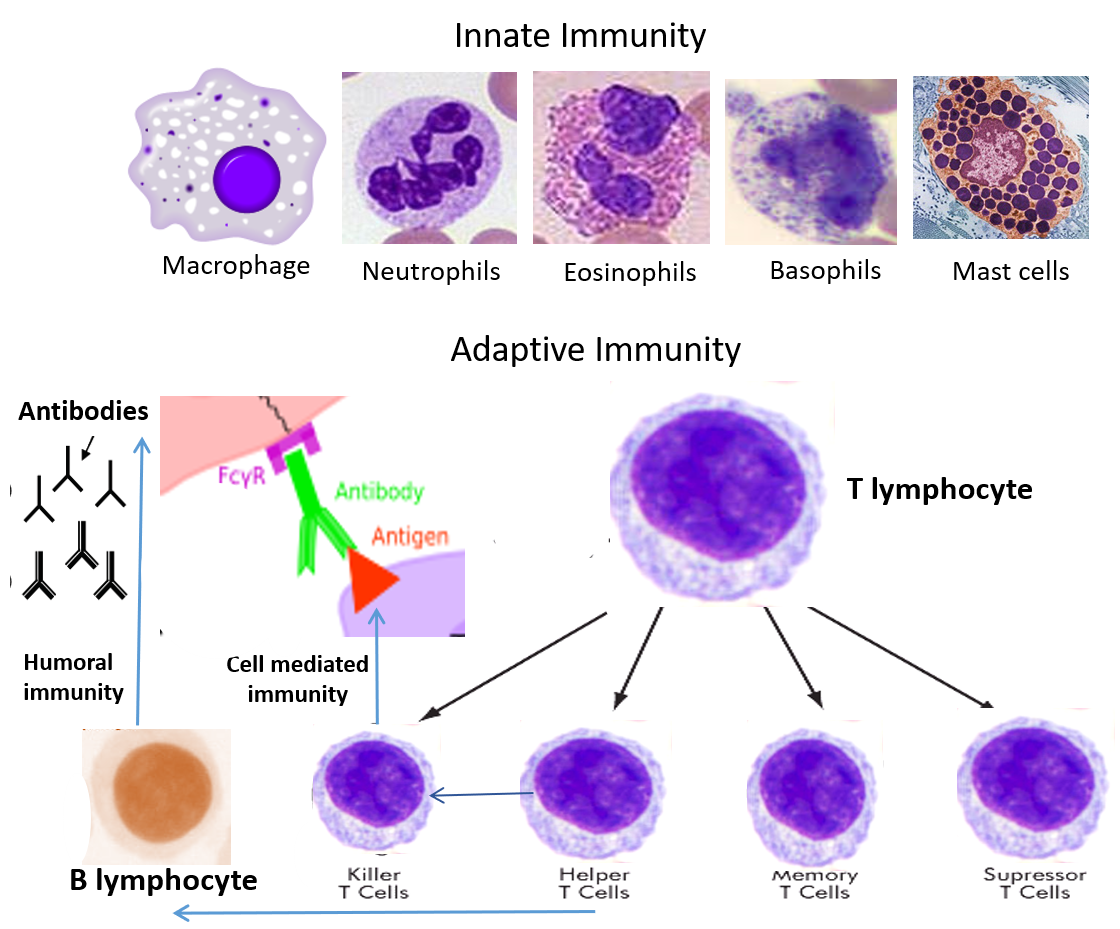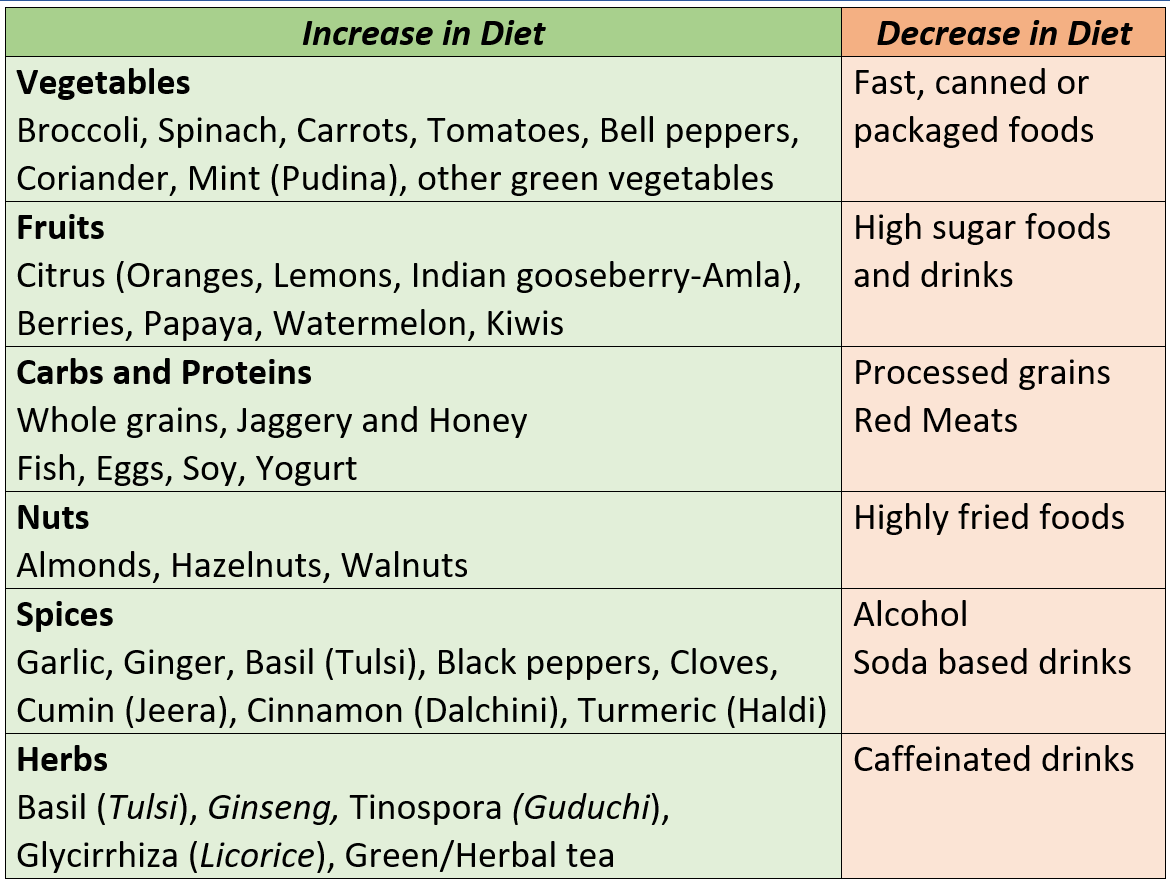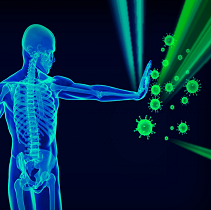Quick read – 5 Factors affecting our Immunity
HOW DOES OUR IMMUNE SYSTEM WORK?
The immune system is our body’s defense mechanism that fights harmful intruding agents (antigens) that include infectious organisms (pathogens) and irritants. It consists of various types of White Blood Cells (WBCs) and their interactive system, which can be compared to the organization and functioning of an Army.
WBCs can contain prominent granules (granulocytes or granular WBCs) or not (agranulocytes or agranular WBCs). Granulocytes include neutrophils, eosinophils, and basophils in the blood and mast cells in tissues. These possess substances in their granules (like histamine, kinins, peroxidase enzymes, etc.) that can fight to destroy the foreign agent (antigen) which has entered the body. Monocytes in blood (transform into macrophages in tissues) are WBCs with fine, relatively less prominent granules.
Innate Immunity
These granulated white blood cells, especially neutrophils and macrophages, represent our innate immunity and are like ‘soldiers’ of the army. They can recognize pathogen-associated molecular patterns (PAMPs) on infectious organisms with the help of their surface ‘antennae’ called toll-like receptors (TLRs). Innate immune response is immediate, short, and non-specific.
Adaptive Immunity
If the pathogen attack is severe, prolonged, and unmanageable by our soldiers, the ‘officers’ of the army that are the lymphocytes (WBCs without granules) are called in. The lymphocytes (two types – T and B lymphocytes) represent our adaptive Immunity. The T lymphocytes – helper T cells and killer T cells have more advanced recognition, strategy, and fighting techniques.
Helper T cells (also called CD4 cells) stimulate B lymphocytes to produce specific ‘antibodies’ (also called immunoglobulins – Ig), which act outside the cells by attaching with and destroying that particular antigen (humoral Immunity). The antibody types include IgM (formed in infections faster but short-lasting), IgG (formed in infections later but long-lasting), IgE (formed in allergies and parasitic infections), and IgA (for local immunity at entry sites). So in lab tests for any infection, the antigen tests are positive immediately, but it takes a few days to test positive for the antibodies.
Killer T cells (also called cytotoxic T cells or CD8 cells) execute their effects by directly destroying the affected cell with its antigens inside it (cell-mediated immunity). Humoral immunity with antibodies is seen in all infections. However, cell-mediated immunity is additionally required for effectively tackling pathogens that reside inside the cells (intracellular). These include viruses, fungi, some bacteria (like the one causing TB), and parasites.
Therefore, the adaptive immunity through the lymphocytes is more specific in approach and also has memory, due to the IgG antibodies and some T lymphocytes (helper and killer) that become long-term memory T cells. This enables a faster and efficient immune response when the same antigen attacks again, and its destruction happens before we even know it or present with symptoms! This is what is called ‘being Immune’ to a particular infection.
There are regulatory checks required to prevent any system from going out of control. This is done in our immune system by regulatory T cells (also called suppressor T cells). The Immune system additionally has messenger proteins called cytokines (interleukins and interferons) that move between cells and relay information, and messenger cells like antigen-presenting cells (APCs) that help in antigen-induced activation of helper T cells.
The fluid part of blood (called plasma) contains proteins called the complement system (C1-9) that also participate in the immune response by assisting the granulocytes and antibodies in clearing the infectious/irritant agent



Read: Inflammation and Allergy
So to summarize, the immune response consists of 2 components:
- a) innate immunity that is immediate, non-specific, and without memory, initiated by granulated WBCs like neutrophils and macrophages.
- b) adaptive immunity, a longer, specific response through T-lymphocytes and antibodies, that has memory.
Sometimes, any of these immune responses can mistakenly attack components of the host human tissues. In case this happens with innate immunity, these are called autoinflammatory diseases, while for adaptive immunity, they are called autoimmune diseases. When any one of these immune responses do not function adequately, there may be immune deficiency.
WHAT IS IMMUNE DEFICIENCY AND REDUCED IMMUNITY?
Immune deficiencies are disorders of any of the components of the Immune system. They may be primary (genetic or present since birth), like Severe Combined Immune Deficiency (SCID – a disorder of B and T lymphocytes), Chediak Higashi disease (defect of granulocytes, mainly neutrophils), or other such diseases.
More commonly, immune deficiencies are secondary, as in infections like HIV (a drop in T helper-CD4 lymphocytes), and patients taking bone marrow-suppressing agents (chemotherapy, radiation) or long-term high-dose corticosteroid medicines. This is also seen in people suffering from severe malnutrition, elderly >70 years, and those with significant heart, lung, kidney, or liver disease. Such patients are prone to infections, and even relatively mild infections can make them very ill and sometimes be life-threatening. People with such conditions require a high level of protection and intensive therapy.
Reduced or sub-optimal immunity may be seen in many people due to inappropriate diet, lifestyle, stress, or during an illness/convalescence. This makes a person catch common infections quickly and recurrently, with a more prolonged recovery time. Such people often appear down with a cold, cough, fever, bowel upset, body pains, weakness, and low energy. This can be effectively tackled or prevented by a healthy lifestyle.
IMPORTANT FACTORS TO MAINTAIN A HEALTHY IMMUNE SYSTEM
These include the Big 5: Diet, Lifestyle, Sleep, Physical Activity, and Hygiene-Protection
Diet
A nutritious diet containing good amounts of protein, vitamins (A, B group, C, D, E), and minerals (zinc, selenium, and iron), along with some herbs and spices, is beneficial for maintaining optimal immunity. An adequate amount of water intake of about 10-12 glasses a day (at least 2.5 liters of preferably lukewarm water) to maintain good hydration is important.



Lifestyle
Modern lifestyles globally are associated with a lot of stress. A state of stress occurs when the body is made to cope with more (physically or mentally) than it can. Stress, fear, and tension cause a lot of consumption of nutrients and resources, thereby weakening the immune system. Stress causes the release of corticosteroids in our body, that also suppresses the immune system. A fulfilled family life, positive attitude, work-life balance, and cultivating enjoyable hobbies can cut down stress and tension. Frequently catching infections or falling ill is a sign of stress and weakened immunity and warrants consideration of conscious stress management. Smoking/tobacco chewing or too much alcohol consumption can also have suppressive effects on immunity.
Sleep
Sleep has a number of effects on the immune system, like better functioning of T lymphocytes, APCs, cytokines, and antibody production. Reduction in either adequate duration or quality of sleep can reduce immunity. Therefore, it is essential to make it a habit to have 8 hours of undisturbed sleep at night on most days. Stress and lack of sleep are often interrelated and can form a vicious cycle, each increasing the other.
Physical Exercise
Regular and appropriate physical exercise that makes you feel energetic and refreshed is associated with improving one’s immunity. It is important that the exercise should not be exhausting, stronger and more vigorous than what one is used to, cause body pain/injury, or be performed in an uncomfortable environment, as in such cases it induces stress which can have adverse effects on immunity.
If starting a new physical exercise regime, increase the rigor and duration gradually, perform suitable warm-ups and cooldowns, and stop if body signals fatigue or stress. Some of the appropriate regular physical exercises include walking, jogging, and swimming, or indoor exercises like Yoga, performing stretches, walking on the treadmill, aerobics, and cycling. Including these activities for at least half-hour daily for 5 days a week, along with simple breathing techniques, is recommended and beneficial for immunity. Sports and outdoor games can be a form of physical exercise, mental relaxation, and social bonding.
Hygiene and Protection
Cleanliness and hygiene in simple daily habits like proper bathing and cleaning of body parts, wearing clean clothes, washing hands before meals and after coming from outside, regular brushing of teeth, covering nose and mouth while coughing and sneezing, not spitting or throwing garbage in public, and maintaining clean surroundings, go a long way in minimizing infections and improving community health.
It is important to make sure that children and those at risk, like the elderly and people with health conditions, are immunized according to the recommended vaccination schedule to protect them from the more severe and serious infections. Vaccines use killed or highly weakened live organisms (whole/ part) to expose the individual to that particular pathogen and stimulate the adaptive immune response to create antibodies and memory T cells. So, vaccines ensure long-lasting protection from that particular infection without actually suffering from it. If several people of a population are vaccinated (or exposed to that particular pathogen), the spread of that infection will be minimized even to those people who are not vaccinated (or exposed). This is called herd immunity.
Certain practices like giving antibiotics for common viral infections, lack of regular exposure to nature, fresh air, or sunlight, and living in unventilated houses can actually have a suppressive impact on the immune system. It is like reducing the alertness and the training of the army!
However, if there is an epidemic or pandemic, it is advisable to follow regulations by health authorities related to restricted travel, social distancing, and hygienic measures. Even though this does not directly improve immunity, it can enable protection and curtailment of rapid disease spread.
There are a number of products available in the market, including herbal and pharmacological combinations, with claims to be ‘immune-boosters‘ or stimulating immunity. Many of these do not have robust or confirmatory clinical evidence of benefits over and above a balanced nutritious diet and lifestyle, in either immediate or long-term effects. Taking supplements of one or a few dietary ingredients may not be really beneficial in the absence of a holistically healthy lifestyle, and in fact, can give a false sense of complacency. Therefore, it is best to take these supplements under a physician’s guidance or recommendation, in situations of dietary or physical activity restrictions, malnourishment, nutritional deficiencies on lab testing, convalescence, specific risk factors, or medical conditions.
AUTOIMMUNITY and AUTOINFLAMMATION
Autoimmunity (autoimmune disorder/disease) is a condition in which the adaptive immune system interprets the body’s own tissues as foreign due to a ‘self versus foreign’ recognition error. Immune cells are activated, and antibodies (called autoantibodies) are produced that target and attack these cells/tissues of the body and cause damage and disease.
Autoinflammatory diseases are rare disorders caused by a dysfunctional innate immune system, leading to recurrent or chronic inflammation.
Autoinflammation and Autoimmunity can have an overlap as they form two ends of a spectrum.
Also read:
Autoimmune Diseases: 15 Well-Known Types and Medical Management
Not getting enough sleep can be detrimental to health: Tackling Insomnia
For any query, additional information or to discuss any case, write to info@drvarsha.com, and be assured of a response soon.
Reference
National Institute of Allergy and Infectious Diseases – Overview of Immunity


